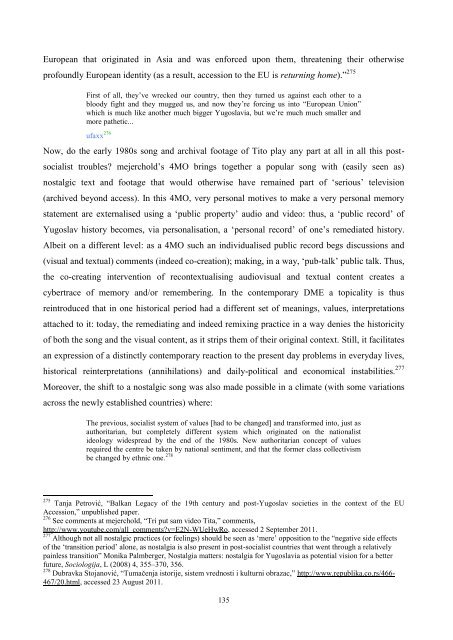UNIVERSITY OF NOVA GORICA GRADUATE SCHOOL ...
UNIVERSITY OF NOVA GORICA GRADUATE SCHOOL ...
UNIVERSITY OF NOVA GORICA GRADUATE SCHOOL ...
Create successful ePaper yourself
Turn your PDF publications into a flip-book with our unique Google optimized e-Paper software.
European that originated in Asia and was enforced upon them, threatening their otherwise<br />
profoundly European identity (as a result, accession to the EU is returning home).‖ 275<br />
First of all, they‘ve wrecked our country, then they turned us against each other to a<br />
bloody fight and they mugged us, and now they‘re forcing us into ―European Union‖<br />
which is much like another much bigger Yugoslavia, but we‘re much much smaller and<br />
more pathetic...<br />
ufaxx 276<br />
Now, do the early 1980s song and archival footage of Tito play any part at all in all this postsocialist<br />
troubles? mejerchold‘s 4MO brings together a popular song with (easily seen as)<br />
nostalgic text and footage that would otherwise have remained part of ‗serious‘ television<br />
(archived beyond access). In this 4MO, very personal motives to make a very personal memory<br />
statement are externalised using a ‗public property‘ audio and video: thus, a ‗public record‘ of<br />
Yugoslav history becomes, via personalisation, a ‗personal record‘ of one‘s remediated history.<br />
Albeit on a different level: as a 4MO such an individualised public record begs discussions and<br />
(visual and textual) comments (indeed co-creation); making, in a way, ‗pub-talk‘ public talk. Thus,<br />
the co-creating intervention of recontextualising audiovisual and textual content creates a<br />
cybertrace of memory and/or remembering. In the contemporary DME a topicality is thus<br />
reintroduced that in one historical period had a different set of meanings, values, interpretations<br />
attached to it: today, the remediating and indeed remixing practice in a way denies the historicity<br />
of both the song and the visual content, as it strips them of their original context. Still, it facilitates<br />
an expression of a distinctly contemporary reaction to the present day problems in everyday lives,<br />
historical reinterpretations (annihilations) and daily-political and economical instabilities. 277<br />
Moreover, the shift to a nostalgic song was also made possible in a climate (with some variations<br />
across the newly established countries) where:<br />
The previous, socialist system of values [had to be changed] and transformed into, just as<br />
authoritarian, but completely different system which originated on the nationalist<br />
ideology widespread by the end of the 1980s. New authoritarian concept of values<br />
required the centre be taken by national sentiment, and that the former class collectivism<br />
be changed by ethnic one. 278<br />
275 Tanja Petrović, ―Balkan Legacy of the 19th century and post-Yugoslav societies in the context of the EU<br />
Accession,‖ unpublished paper.<br />
276 See comments at mejerchold, ―Tri put sam video Tita,‖ comments,<br />
http://www.youtube.com/all_comments?v=E2N-WUeHwRo, accessed 2 September 2011.<br />
277 Although not all nostalgic practices (or feelings) should be seen as ‗mere‘ opposition to the ―negative side effects<br />
of the ‗transition period‘ alone, as nostalgia is also present in post-socialist countries that went through a relatively<br />
painless transition‖ Monika Palmberger, Nostalgia matters: nostalgia for Yugoslavia as potential vision for a better<br />
future, Sociologija, L (2008) 4, 355–370, 356.<br />
278 Dubravka Stojanović, ―Tumaĉenja istorije, sistem vrednosti i kulturni obrazac,‖ http://www.republika.co.rs/466-<br />
467/20.html, accessed 23 August 2011.<br />
135

















